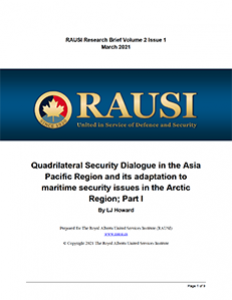Quadrilateral Security Dialogue in the Asia Pacific Region and its adaptation to maritime security issues in the Arctic Region; Part I
International LawLJ HowardBy LJ Howard, 30 March, 2021
RAUSI Research Brief Volume 2, Issue 1
This note is the first in a series that diagnoses the conditions for success of one of the means currently (2021) being employed to settle an international maritime dispute in the Asia Pacific region. The note’s intent is to determine if and how such measures can successfully apply to other maritime disputes, such as those in the Arctic region. The means include multilateral diplomacy and bilateral treaty regimes. They test modalities of interpreting UN Charter Arts 2(4) and 51 concerning the threat or use of force in dispute settlement. The notes will inform those concerned with policy and law, multinational uniformed defence and security planning, and technology and capital equipment.
The Quadrilateral Security Dialogue is a forum of non-binding multilateral diplomacy whose participants include Australia, India, Japan and US, with at least one other state’s participation pending. The Quad’s express intention is to maintain a liberal rules-based international order in the Asia-Pacific region. Its intended outputs and outcomes are to mitigate geopolitical risks to the order’s norms which may arise from other states’ asserting expanding claims to prescriptive and enforcement jurisdictions in the region. The risks concern, for example, limited freedom of navigation in the South and East China Seas. The Quad has not expressly cited any such ‘other state.’ Notwithstanding, the People’s Republic of China’s advancing separate bilateral trade issues with each of the Quad’s current members while concurrently pursuing its policy in domestic security and sovereignty may fracture unity of effort by the Quad and hence reduce its effectiveness. Further, China employs a historically grounded modality of interpretation of international law that shapes its geopolitical strategy. Japanese and US policy research suggests that bilateral Japan-US treaty-based diplomacy may prove as cost-effective in securing regional security as those of the more provocative multilateral ‘Asian-NATO’-like Quad, whether per the Security Treaty Between the United States and Japan (1951), the Treaty of Mutual Cooperation and Security between the United States and Japan (1960) or otherwise.
In the context of the Arctic region, identifying lessons from the Quad’s experience and the necessary and sufficient conditions for its success may inform states who are asserting vital national interests in the region, and may assist in settling competing claims to jurisdiction. Comparative analysis.

